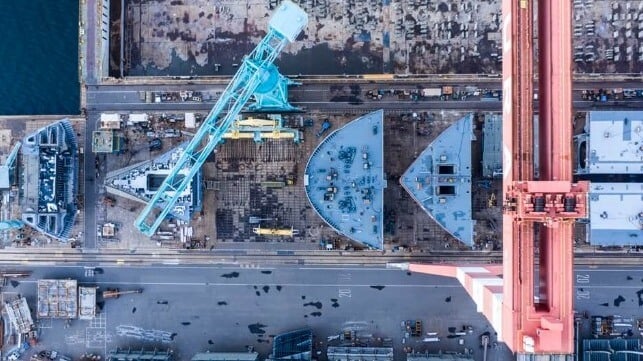South Korea Wins Trade Deal With $150 Billion U.S. Shipbuilding Pledge

The government of South Korea has secured a favorable 15 percent U.S. tariff rate by pledging a $350 billion investment package in American industry, including a $150 billion "Make American Shipbuilding Great Again" investment in U.S. shipyard capacity.
The idea of a very large Korean shipbuilding investment has been actively discussed for months as a possible bargaining chip in trade negotiations, and the rumors picked up after Japan made a $550 billion industrial investment commitment of its own. Unlike Japan's proposal, Korea's pledge has a specific carve-out for shipyards.
The objective of the fund is to provide loans, guarantees and investments that will help Korean shipbuilders to expand into the U.S. market, industry insiders told Korea Herald. President Donald Trump broadcast a different interpretation, suggesting in a social media post that "South Korea will give to the United States $350 Billion Dollars for Investments owned and controlled by the United States, and selected by myself" (caps original).
U.S. shipbuilding is largely conducted for defense purposes, and the sector has been a top expansion target for Korean yards for years. Korea's "Big Three" have a high degree of skill in complex shipbuilding but a declining market share in the commercial space, handicapped by a domestic labor shortage and fierce Chinese competition. With yards in the U.S., they could market their capabilities to the biggest shipowning enterprise in the world - the United States Navy, which has more employees, more capex resources and a more valuable fleet than any other entity. The Navy's annual expenditure on new ship construction comes to about $30 billion, equal to about 15 percent of all merchant ship orders worldwide in 2024.
"The US market is about warships rather than commercial vessels," one Korean shipbuilding executive told Korea Herald. "The warship market is huge."
Korean shipbuilder Hanwha has already begun testing the waters with overseas ship repair services for Military Sealift Command, and has received positive reviews for its work. Hanwha's business plan for its newly-acquired Philly Shipyard also proposes some amount of military sales.
Like the earlier Japanese deal, Korea's investment pledge is a handshake commitment, and does not yet include specific projects or an investment timeline. The overall $350 billion fund would amount to 70 percent of annual Korean government spending, so less costly ways of achieving the total (like loan guarantees) and an investment spread out over time may be part of the proposal.

that matters most
Get the latest maritime news delivered to your inbox daily.
For Korea, the short-term gains from the deal are essential. Without an agreement, U.S. tariffs on Korean autos and other exports would have risen to 25 percent, undercutting their competitiveness in the lucrative American consumer market. “We just overcame a big challenge,” South Korea’s President Lee Jae Myung said. “Today’s deal eliminated uncertainty in the export environment.”
An additional Korean pledge of $100 billion in purchases of U.S. LNG and other energy products over the remainder of Trump's current term is intended to support energy trade volumes. The EU has previously pledged to buy $250 billion in American energy products annually over the same period, an amount that many independent analysts suggest is unlikely to be achieved.
